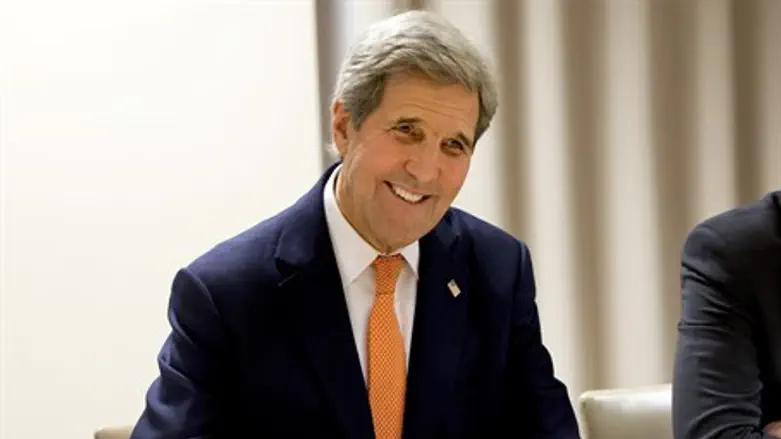
Days after Iran received hundreds of billions of dollars in sanctions relief from the controversial nuclear deal, US Secretary of State John Kerry on Thursday admitted a good portion of the massive funds will go to terror.
Speaking at the sidelines of the World Economic Forum in Davos, Switzerland, Kerry spoke about the massive kickback Tehran is receiving after nuclear sanctions were lifted last weekend.
"I think that some of it will end up in the hands of the IRGC (Islamic Revolutionary Guard Corps) or other entities, some of which are labeled terrorists," he acknowledged to CNBC.
"You know, to some degree, I'm not going to sit here and tell you that every component of that can be prevented. But I can tell you this, right now, we are not seeing the early delivery of funds going to that kind of endeavor at this point in time."
Iran itself is designated as a state sponsor of terror by the US, and the US Department of Treasury designated the IRGC's Quds Force that is responsible for missions abroad as a terrorist organization back in 2007. Iran likewise has been propping up its Lebanese terror proxy Hezbollah, an internationally recognized terror group which has an estimated 150,000 missiles pointed at Israel.
Kerry also tried to play down the estimates of just how much Iran is receiving in sanctions relief, with estimates placing the figure at between $100 billion and $150 billion.
He claimed those estimates were incorrect, saying that Iran owes a large amount in foreign debt and therefore it will "only" be left with a windfall of $55 billion to fund its terrorism.
Heavy concerns remain over the nuclear deal, given that Iran will be allowed to inspect its own covert nuclear sites such as Parchin, and likewise can simply wait for the limitations on its nuclear program to expire under the deal in 15 years. The leading state sponsor of terror has continued to show a hostile stance vis-a-vis America, recently capturing and releasing ten US Navy sailors.
Kerry defends missile sanctions
Earlier on Thursday Kerry responded to Iranian anger over new sanctions imposed by the US on Sunday against Iran's ballistic missile program, following serious breaches.
"We have made it very clear that we use sanctions when we think they are appropriate in order to counter behavior that we believe has broken the law or has challenged the United Nations Security Council or threatened the United States and we stand by our sanctions," Kerry said.
"We think they have been used judiciously and effectively and we are looking to move on now to put to test the willingness of Iran and other countries in the region to try to reduce tensions and move in a different direction."
Iran lost no time responding to the sanctions, vowing on Monday it will defy the new sanctions and continue expanding its ballistic missile program.
The new missile sanctions come after Iran conducted an Emad medium range ballistic missile test on October 10, in addition to other tests. UN sanctions monitors confirmed the Emad rocket is capable of carrying a nuclear warhead, making it a violation of a UN Security Council resolution.
Iran has since flouted other expectations in the deal. Earlier this month Iran publicly revealed its 14 underground "missile towns," with the latest facility being shown on Iranian media as convoys of the nuclear-capable Emad missiles were transferred in.
In response to the missile tests, US President Barack Obama in late December threatened to implement new sanctions on Iran's rocket program. A day later Iranian President Hassan Rouhani threatened that Tehran would accelerate the development of its arsenal, and a day after that Obama backed down and delayed the new sanctions.
